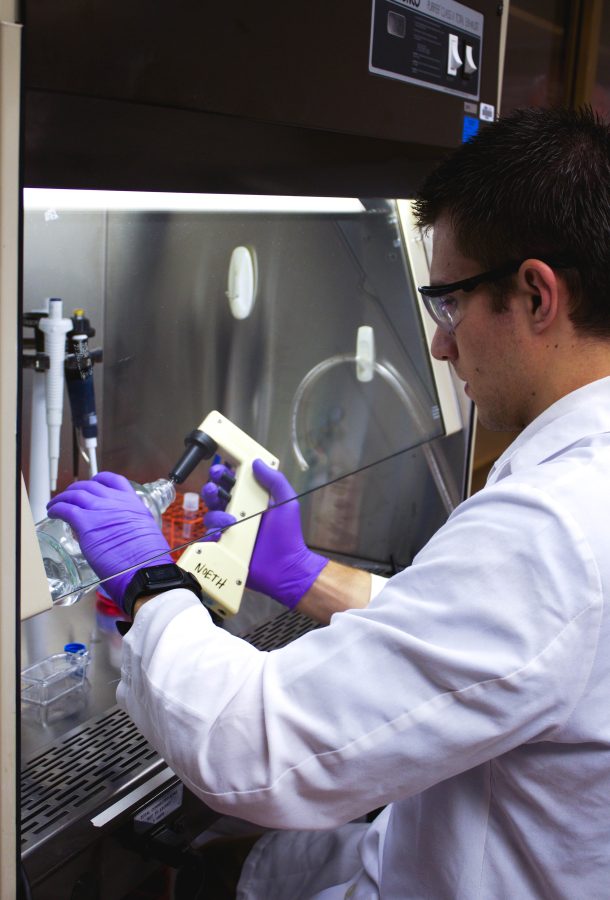BJU’s Cancer Research Lab, located in Barge, is not only a place to research cures for a disease that has forced its way into many of our lives, but also a place for students to learn, apply what they’ve already learned and prepare for their future careers.
Dr. Steve Figard, the director of the Cancer Research Lab at BJU, said the lab is an environment where students can learn how to do actual research not only by being taught, but also by actually getting in the lab and conducting experiments on their own.
Figard said the lab gives students a unique experience because the research is not scripted. In other classes, students work with clear problems that already have answers. But Figard said experiments at the lab have no correct answers, and problems frequently occur that challenge the students to think logically, use the scientific method, interpret the results and brainstorm new ideas. In addition, Figard said the lab gives students a rare undergraduate research opportunity, allowing them to be one step ahead of most undergraduate students in their field. Having research experience on a résumé makes applicants more credible, Figard said.
Figard, who came to BJU three years ago with more than 25 years of research experience as a biochemist at Abbott Laboratories in Illinois, not only teaches classes but also writes proposals for supplies and equipment for the lab. Even with his distinguished background in research, Figard considers it “a privilege and an honor” to be teaching and researching at BJU. “I can see how the Lord has prepared my entire research experience to fill this particular niche,” Figard said.
This past summer, four BJU students – Danny Machado, Anthony Nye, Emily Harris and Hannah Ng – participated in Research Immersion for Undergraduates (RIU), an internship funded by the Science and Engineering Endowment Fund that allows students to devote eight weeks of their summer to cancer research. The internship demanded complete devotion: students were required to work Monday through Friday, 8 a.m. to 5 p.m., and they couldn’t work another job. Even though the interns technically didn’t have to work after 5 p.m., they often worked in the lab after hours. “Experiments don’t wait for you,” Hannah Ng, a junior premed major and one of the summer interns, said.
Collectively, the interns researched four matters related to cancer during the eight weeks: extracting a cancer-killing agent from almonds, 2-D and 3-D cell development, using Gila monster venom as a potential therapeutic agent, and using nanoparticles as a potential therapeutic agent. Although they worked on separate projects, Ng said the internship taught her the importance of teamwork as the interns all relied on each other in their personal research.
On Oct. 29, faculty and students from the Cancer Research Lab will travel to Washington, D.C., to present a poster summarizing their lab work on the almond research project, which they originally submitted to the American Institute for Cancer Research at the end of the summer.
The students and faculty learned many things individually over the summer, but as a group, they learned the importance of praying for all things, big and small.
Figard described times when experiments weren’t producing the desired results or students’ ideas weren’t working, and they realized that they hadn’t committed their concerns to God. “After praying we started to see answered prayers,” Figard said.
Ng said her experience in the Cancer Research Lab broadened her perspective on how to conduct research, taught her processes that she wouldn’t have learned otherwise and sharpened her thinking abilities.
The Cancer Research Lab is not only a place where students and faculty can use their God-given abilities, but also a place where students can improve and sharpen their gifts to be used in the future to help people all around the world.





















































